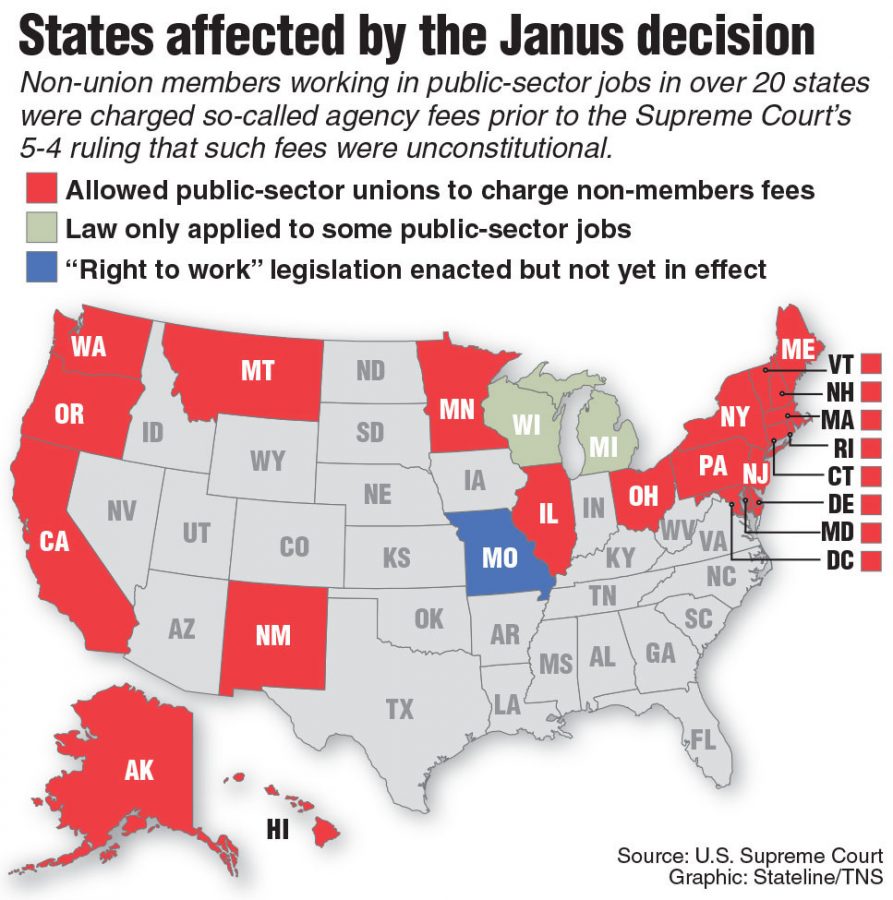Democrats defeated in the Supreme Court months before midterm elections
September 19, 2018
This summer marked several losses for Democrats in the judiciary branch, as Justice Anthony Kennedy resigned, leaving Roe v. Wade hanging by a thread, and the Janus v. AFSCME decision handicapping public-sector unions by making “agency fees” optional for public employees.
The Janus decision essentially turned the entire United States into a “right-to-work” state, as allowed via the Taft-Hartley Act. This means that even though employees may benefit from collective bargaining and other practices facilitated by their union, they will not be required to pay for such expenses through obligatory fees.
While public-sector unions are still strong, without the funding generated by the previously mandatory fees, they are not predicted to be able to sustain this blow with the capacity they once had. Consequently, it is expected that union membership nationwide will begin to plummet.
According to an article recently published by The Atlantic, which cites Frank Manzo, policy director at the Illinois Economic Policy Institute, and Robert Bruno, labor professor at UIUC, “…a decision in favor of Janus could reduce the union membership of state and local government employees by 8.2 percentage points, or 726,000 union members.”
This may prove to be catastrophic for the Democratic party, as public-sector unions have historically been strong supporters of Democratic campaign efforts. Without this membership, funding for the unions will seriously plummet, as will their political and legal power. However, it is by this same token that Janus v. AFSCME became a Supreme Court decision in the first place. Janus’ argument against the union was that his required $45 monthly fee supposedly violated his first amendment right to free speech as he did not support the political opinions of AFSCME.
Justice Alito voices his perspective on the matter by stating, “Compelling individuals to mouth support for views they find objectionable violates that cardinal constitutional command, and in most contexts, any such effort would be universally condemned.”
However, clearly the decision became a partisan issue, resting on the fact that public-sector unions are so crucial to the Democratic party. The Janus v. AFSCME decision ruled 5-4 in favor of Janus, with dissenting opinions from Justices Kagan, Sotomayor, Ginsburg, and Breyer– all of whom typically lean left.
As observed by the media and the public, this decision was a huge anti-union move and many find it unethically in dispute with the 1977 Abood v. Detroit Board of Education Decision, which it overrules. Abood allows public-sector unions to require fees for collective bargaining purposes, but makes it distinctly illegal and unconstitutional to use those funds for politically affiliated activities. Abood was a fundamental ruling in American legislation, and this past week’s decision has simply wreaked havoc on the precedent it set.
“There is no sugarcoating today’s opinion” Justice Kagan dissents. “The majority overthrows a decision entrenched in this Nation’s law— and in its economic life—for over 40 years. As a result, it prevents the American people, acting through their state and local officials, from making important choices about workplace governance. And it does so by weaponizing the First Amendment, in a way that unleashes judges, now and in the future, to intervene in economic and regulatory policy.”








